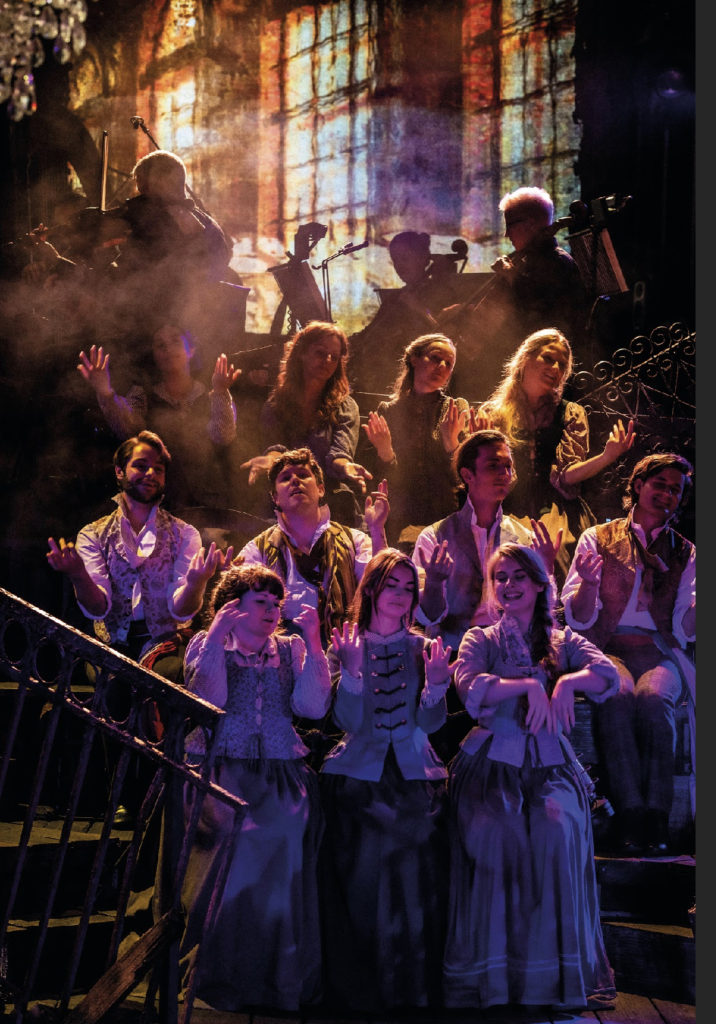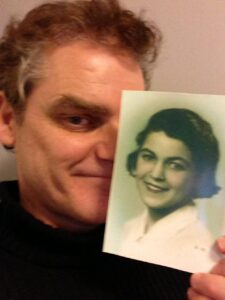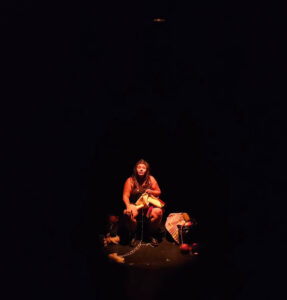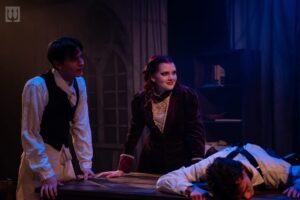
In 1994 when I was nine years old my mother took my best friend and I to see Les Misérables at Neptune Theatre starring Frank MacKay (Jean Valjean), Thomas Goerz (Javert), Charlotte Moore (Fantine), Cliff LeJeune (Thénardier) and Dan Chameroy (Marius). It was a profoundly life-altering experience for me. It’s the first show I remember going to see at Neptune, and the first professional theatre production I remember seeing as well. It felt like a grownup event, the theatre felt massive to me, and everyone there looked sophisticated. I read the programme over and over and over, memorizing the actors’ names and their program bios. Victor Hugo’s story of a good man being pursued by a vengeful police inspector and the way Valjean helped save Cosette and Marius along the way spoke to my innocent sense of justice: that people should be judged not by the mistakes they may have made in the past, but their intentions and the way they live their lives in the present. The music by Alain Boublil and Claude-Michel Shonberg stirred my soul, teaching me that an epic story like this one could be told almost entirely in song, and showing me the deep sense of empathy and catharsis that seeing a story with so much sadness and death in it could bring, even to a child. I remember being relieved at the end of the play when everyone came out to bow during the curtain call. I knew that the dying had only been pretend, but I still needed to be reassured. I believed so wholeheartedly in everything I had seen. I marvelled in the knowledge that there were people here who knew how to pretend so convincingly and sing so beautifully. I had a Barbie doll that I named Cosette after that, and I was given Les Misérables: The Dream Cast in Concert (1995), shortly thereafter on two VHS tapes, and I watched Colm Wilkinson (Jean Valjean), Philip Quest (Javert), Ruthie Henshall (Fantine), Lea Salonga (Éponine) and Judy Kuhn (Cosette) tell me the story again and again and again. I remember thinking how incredible it was that you could watch Wilkinson and Quest standing side by side sharing a microphone while singing about how Javert was desperately searching for Valjean, in a way that made no logical sense at all, but the urgency of Quest’s voice and the breadth of the music, made logic incidental. My imagination filled in the blanks. That was the magic of the theatre. Despite naming my doll Cosette, my favourite character in Les Misérables was always Gavroche. I admired his impish courage and I felt like his death, the death of the impoverished child who not only dreams of a better future but who insists on fighting for one, was the most devastating. Adam Searles’ performance in the 10th Anniversary video was who I aspired to be as a budding theatre performer. Subconsciously, I think I realized then (at around ten) that if you wanted to play a character who has agency, especially as a young person, you probably would have to play a boy.
The older I’ve gotten and the more I have grown into my place in the theatre community in Halifax, and in the Canadian Theatre Community as a whole, the more I have realized that my intense experience with Les Misérables is in no way unique; in fact, a huge number of us have deeply personal experiences with this show. For many, Les Mis was instrumental in inspiring them to pursue careers in the theatre, or a foundational element in a fundamental understanding of musical theatre as a genre.
Sam Rosenthal the Artistic Producer of Eastern Front Theatre remembers, “In 1993 I entered the acting program at Ryerson Theatre School (in Toronto). Full of hope, but clueless as to the madness that this business would expose me to, I boldly jumped in. I was terrified. One of the first things we were told was to start going to the theatre and see as much as we could. In January of 1993 a musical called Les Misérables was running at the Royal Alexandra Theatre. It featured a Canadian cast. I went to the show with several schoolmates and what I saw changed everything. The 2 hour and 40 minute production roared into my heart the moment when the orchestra kicked in with the first chord. I had never felt this rush before, the great hair- raising, blood rushing to my head feeling of sheer joy. The cast was so locked in, so part of the world on stage that I immediately and desperately wanted to be part of the show. I watched in awe, song after song, and felt the resolve and clarity like never before- I would do this. I would be part of a large scale musical giving audiences this type of experience. I would make it on to one of the big stages in Toronto and do a musical of this magnitude. Just when I thought the show couldn’t get more personal and close to my heart, the Thénardiers hit the stage: “Welcome, Monsieur sit yourself down.’ Wow, that was THE MOMENT. I actually saw myself doing that role. That was the gift of Les Mis. It made everything personal… When Éponine died, I was shocked at how deeply I felt. I had never cried so much at theatre. When the students died on the barricade I was angry and wanted to jump on stage. I was filled with a sense of awe and a sense of purpose. I had to do this… Years later, as I make my [way] through this glorious, heartbreaking, wonderful business I always remind myself on the tough days why I am still doing this. All I need to do is close my eyes and think back to those first few dramatic chords of Les Mis. Then I remember why. This coming January I will achieve my dream of being in a large-scale musical on one of the most glorious stages in the country: The Elgin Winter Garden Theatre, playing a dream role in the musical Caroline or Change. When the curtain goes up, I will take a quiet moment and thank Les Mis. for getting me here. It was that show that allowed me to dream, to hang on to the vision when there were days it felt impossible.”
Les Misérables can be a masterclass for theatre artists explains Ron Cameron-Lewis, former Musical Theatre Performance teacher and director at Sheridan College who has directed over a hundred theatre productions, “I saw Les Miz twelve times, but my accountant disagreed with my tax deductions. I pointed out that I couldn’t learn to be a better director of musical theatre until I learned how to anticipate the next stage movement. There is no school to teach such intricacies. One just needs to see a brilliant production over and over again.”
For Neptune Theatre’s Artistic Director, Jeremy Webb, his initial reaction to Les Misérables was not love at first sight. “I was twenty years old and the first time [I saw the show] I did not like it at all,” Webb says, “I didn’t get it. But, I bought the Original Cast Recording at the theatre, listened to it in my car, and then went back a few months later knowing the songs… Then started a thirty year love affair. My dream to be in it slowly faded as I aged… [but] my need to direct it was only deepened after I directed a gigantic youth production in Antigonish about fifteen years ago. I know EVERY single word. I have seen it maybe 20-30 times. It gives me life.”
Despite, or perhaps because of its harrowing themes of death, desperation, systemic violence and poverty, rebellion, and misery Les Misérables is often chosen as a musical for young people to perform. Neptune Theatre School’s Youth Performance Company has mounted several different productions of the Junior version of the show. Mary Lou Martin directed the production with the YPCo in December, 2008 with Musical Director Matthew Amyotte. She says, “I think what resonates with student casts is that they are given license to approach themes that are operatic in scope. That it is fully sung through is a link between their singing skills and acting that knit beautifully to find the actor within, sometimes it will actually catch a young actor by surprise. The score is so brilliantly constructed, the modulations and key changes are perfect. “One Day More,” one of the best anthems in all of musical theatre, just to be in the middle of a big sing [like that] is a thrill. I have had students weep, not for the content, but for the sheer experience of singing it with their company. Rebellion against injustice is in all teenagers’ souls, few get to realize it in their lives. This play gives them that in spades. Having done Junior versions of other shows, Les Mis is the most carefully and smartly cut. Some Junior versions are clunky and trite, as if the condensers don’t give the casts credit to pull off the content or the journey.” Sarah Richardson who Co-Musical Directed a more recent YPCo production of the show agrees saying, “I think that it’s one of the first shows, even in the Junior, version, that doesn’t pull punches with [the young performers]. It’s an adult show, and it gives them the opportunity to show the gravitas that is usually deferred to people “more mature” than them. As singers, it challenges them. I was so impressed with my team. Most weren’t even familiar [with the show] when it was announced, yet they arrived fully prepared, with very complex music.”
The Neptune Production had a very harrowing Closing Performance in 1994. Steve Ross, who was in the cast recalls, “On our closing performance the revolving stage broke halfway through the show, which meant that once the barricades were set up we couldn’t revolve around to the other side. In the Second Act little Gavroche was to climb over the barricades as the set revolved to show him stealing bullets off of the bodies of the soldiers. This scene climaxed with our little brave soul getting shot. However, none of this was possible because the set couldn’t revolve. None of us knew what to do, or how to help at all. Without missing a beat, our wonderful ten year old Gavroche just climbed up to the top of the barricades…. spread his arms…. a gunshot went off, and he just fell backwards off the ten foot structure and trusted that someone would catch him. Which is exactly what happened. No one ever told this young man to do this. He just took it upon himself to make the scene happen, and help the show to continue on. I’ll never forget it. What a way to finish off a wild run of a show.” Angela Gasparetto who was ushering at Neptune Theatre at the time watched this happen from the audience, after having seen the show twelve times. She said, “I was sitting on the back bench and [director] Linda Moore was sitting there as well. I remember her standing up when she realized the barricade wasn’t starting to separate the move off with all the “dead bodies” on it. The audience didn’t know. I held my breath. I watched the stage and Linda watching the stage. And then magic happened as all as the “dead” actors lying all over the barricade – including a very young and brilliant Bruce Godfree [as Gavroche]- began to crawl, limp and help each other off the stage as the wounded- it was brilliant; I remember the subtle sound of wood ripping as the barricade came off, not aligned as it should have been due to the revolve not having been able to adjust. The show went on in all its glory by a company of actors and crew who made it work. I’ll never forget it. It was an ensemble of artists (on and off stage) defending that night of storytelling and making it happen together. It was wonderful.”
On December 12th a new staging of Les Misérables is being broadcast live from the Gielgud Theatre in London’s West End to Cineplex Cinemas Halifax (190 Chain Lake Drive) in Halifax at 7:00pm. Tickets are available HERE. Come and have a profound, theatrical experience at the movies!






